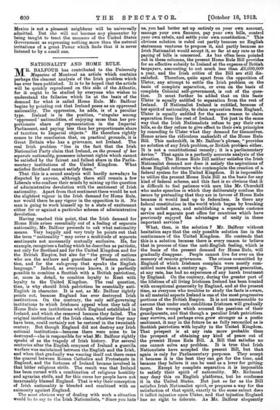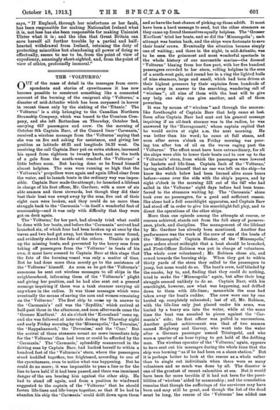NATIONALITY AND HOME RULE.
MR. BA.LFOUR has contributed to the University Magazine of Montreal an article which contains perhaps the clearest analysis of the Irish problem which has ever been published. It is to be hoped that the article will be quickly reproduced on this side of the Atlantic, for it ought to be studied by everyone who wishes to understand the fallacies which lie at the basis of the demand for what is called Home Rule. Mr. Balfour begins by pointing out that Ireland poses as an oppressed nationality. The oppression, he adds, is of a peculiar type. Ireland is in the position, "singular among ' oppressed ' nationalities, of enjoying more than her pro- portionate share of representation in the Imperial Parliament, and paying less than her proportionate share of taxation to Imperial objects." He therefore rightly comes to the conclusion that, on practical grounds, it is Great Britain who has a grievance, not Ireland. The real Irish problem "lies in the fact that the Irish Nationalist Party claim that Ireland, on the ground of her separate nationality, possesses inherent rights which cannot be satisfied by the fairest and fullest share in the Parlia- mentary institutions of the United Kingdom. What satisfies Scotland cannot satisfy them."
That this is a sound analysis will hardly nowadays be disputed by anyone, although there still remain a few Liberals who confuse their minds by mixing up the question of administrative devolution with the sentiment of Irish nationality. Apart from that sentiment there would be not the slightest vigour in the Irish demand for Home Rule, nor would there be any vigour in the opposition to it. No man is going to work himself up to a state of excitement either for or against a particular scheme of administrative devolution.
Having reached this point, that the Irish demand for Home Rule arises essentially out of a feeling of separate nationality, Mr. Balfour proceeds to ask what nationality means. Very happily and very truly he points out that the term "nationality " may cover a multitude of separate sentiments not necessarily mutually exclusive. He, for example, recognizes a feeling which he describes as patriotic, not only for Scotland and for the United Kingdom and for the British Empire, but also for " the group of nations who are the authors and guardians of Western civiliza- tion, and for the sub-group that speaks the English language." Indeed, as everyone knows, it is perfectly possible to combine a Scottish with a British patriotism, or, more in detail, to combine loyalty to Kent with loyalty to the United Kingdom. The real question, then, is why should Irish patriotism be essentially anti- English in character. It is not, as Mr. Balfour rightly points out, because England has ever destroyed Irish institutions. On the contrary, the only self-governing institutions to which Irishmen appeal when they talk of Home Rule are institutions which England established in Ireland, and which she removed because they failed. The original institutions of the Irish clans, whatever they may have been, could certainly not be restored in the twentieth century. But though England did not destroy any Irish national institutions—because there were none to be destroyed—she is responsible for what Mr. Balfour rightly speaks of as the tragedy of Irish history. For several centuries after the English conquest of Ireland a guerilla warfare was maintained between the English and the Irish, and when that gradually was wearing itself out there came the quarrel between Roman Catholics and Protestants in England, and the fortunes of Ireland became involved in that bitter religious strife. The result was that Ireland has been cursed with a combination of religious hostility and agrarian strife, and for this curse her people have not inexcusably blamed England. That is why their conception of Irish nationality is blended and combined with an animosity against England.
The most obvious way of dealing with such a situation would be to say to the Irish Nationalists, " Since you hate us, you had better set up entirely on your own account, manage your own finances, pay your own bills, control your own rebels, and settle your own constitution." This obvious solution is ruled out partly because no English statesman ventures to propose it, and partly because no Irish Nationalist would accept it, so far at any rate as the paying of bills is concerned. As has often been pointed out in these columns, the present Home Rule Bill provides for an effective subsidy to Ireland at the expense of British taxpayers, amounting to not much less than £6,000,000 a year, and the Irish critics of the Bill are still dis- satisfied. Therefore, quite apart from the opposition of Ulster, any attempt to settle the Irish problem on the basis of complete separation, or even on the basis of complete Colonial self-government, is out of the ques- tion. It must further be added that on this basis Ulster is equally entitled to separation from the rest of Ireland. If Nationalist Ireland is entitled, because of her spirit of nationality, to claim separation from England, Ulster is equally entitled for the same reason to claim separation from the rest of Ireland. Yet just in the same way that the Irish Nationalists refuse to pay their own bills, so do they refuse to give effect to their own principles by conceding to Ulster what they demand for themselves. Hence arises the ridiculous makeshift of the Home Rule Bill. This makeshift, in Mr. Balfour's phrase, "provides no solution of any Irish problem, or British problem either. It is not a constitutional remedy ; it is a parliamentary device." That again is a perfectly accurate analysis of the situation. The Home Rule Bill neither satisfies the Irish Nationalist demand nor does it satisfy the aspirations of those English reformers who contemplate the creation of a federal system for the United Kingdom. It is impossible to utilize the present Home Rule Bill as the basis for any kind of federal scheme, and this fact is so obvious that it is difficult to feel patience with men like Mr. Churchill who make speeches in which they deliberately confuse the issues by pretending that they are in favour of Home Rule because it would lead up to federalism. Is there any federal constitution in the world which began by breaking up a united area, and establishing a separate customs service and separate post office for countries which have previously enjoyed the advantages of unity in these important services ?
What, then, is the solution ? Mr. Balfour without hesitation says that the only possible solution lies in the continuance of the -United Kingdom. He contends that this is a solution because there is every reason to believe that in process of time the anti-English feeling, which is the basis of the present demand for Home Rule, will gradually disappear. People cannot live for ever on the memory of remote grievances. The crimes committed by England of which Irishmen complain were mostly com- mitted more than a century ago. The present generation, at any rate, has had no experience of any harsh treatment by England. On the contrary, during the greater part of the lifetime of all living Irishmen Ireland has been treated with exceptional generosity by England, and at the present time, as everyone who troubles to study the facts is aware, in all material aspects Ireland is one of the most progressive portions of the British Empire. It is not unreasonable to assume that under such conditions Irishmen will gradually forget the wrongs which aroused the passions of their grandparents, and that though a peculiar Irish patriotism may survive, and perhaps even grow stronger as a poetic sentiment, it may in the future be as fully reconciled as is Scottish patriotism with loyalty to the United Kingdom. That prospect is at any rate more probable than the prospect of obtaining any kind of peace out of the present Home Rule Bill. A Bill that satisfies no one cannot solve any problem. It is true that Irish Nationalists have accepted the present Bill, but that again is only for Parliamentary purposes. They accept it because it is the best they can get for the time, and because they believe it can be used as a lever for getting more. Except by complete separation it is impossible to satisfy their spirit of nationality. Mr. Redmond may deny this on English platforms, but he confesses it in the United States. But just so far as the Bill satisfies Irish Nationalist spirit, or prepares a way for the satisfaction of that spirit, exactly to the same extent does it inflict injustice upon Ulster, and that injustice England has no right to tolerate. As Mr. Balfour eloquently says, "If England, through her misfortune or her fault, has been responsible for making Nationalist Ireland what it is, not less has she been responsible for making Unionist Ulster what it is ; and the idea that Great Britain can save herself all further trouble by a partial and half- hearted withdrawal from Ireland, retaining the duty of protecting minorities but abandoning all power of doing so effectually, seems to me to be, from the point of view of expediency, amazingly short-sighted, and, from the point of view of ethics, profoundly immoral."















































 Previous page
Previous page